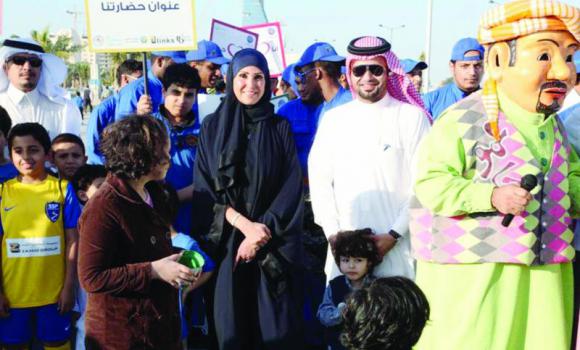
Jeddah, Jan 5: The massive campaign launched by the Saudi Environment Society to protect the Jeddah corniche environment was a big success with the participation of a large number of people.
As part of the campaign, the Friends of Corniche held a big procession from northern corniche to Coast Guard office, covering 30 km to enlighten people who visit the corniche on the importance of protecting its environment.
The procession was attended by students from the Saudi Japanese Automobile High Institute, Dar Al-Hekma College and Omar bin Khattab Primary School apart from trainees attending a Brazilian football course. Baba Hakeem, a cartoon character, was also present to explain Jeddah’s history and progress.
It was the fourth campaign organized by the society, said Prince Nawaf bin Nasser, CEO of the organization. He commended the participants for showing their patriotism and support for protecting corniche environment.
“This is part of the activities of the national program for sustainable development,” the prince said. He commended the Saudi youth for their active participation, saying it reflected their constructive role in society.
Saud Al-Sheikhi, director of the Culture and Information Ministry’s branch, spoke highly about the society for launching the awareness program. “All sectors should join hands to spread a culture of preserving environment,” he said and pledged the ministry’s support to any effort aimed at environmental protection.
Majida Aburas, deputy executive director of the society, said more than 30,000 people had participated in the “I love Jeddah” campaign during the past three weeks.
“The program was aimed at creating a high level of awareness among the public to protect the country’s environment,” she said.
Aburas said the program targeted all groups of people in society including expatriates. It focused on personal cleanliness, garbage management and its effect on environmental pollution and marine and coastal environment, environmental friendly shopping, encouraging sustainable consumption patterns, preservation of natural resources and the link between health and environment.
The executive plan for environment protection will be implemented in 10 years, Aburas said. “Such a period is required for assessing the change of behavior among individuals and other targeted groups,” she said.
Salim Al-Asmari, executive director of the automobile institute, commended the program for developing a civilized behavior among the younger generation. He said his institute was conducting a number of programs as part of its social responsibility.
Suhair Al-Qurashi, dean of Dar Al-Hekma College, said her institution was happy to participate in the environment awareness program. “Women should be considered a strategic partner in social work.”







Comments
Add new comment